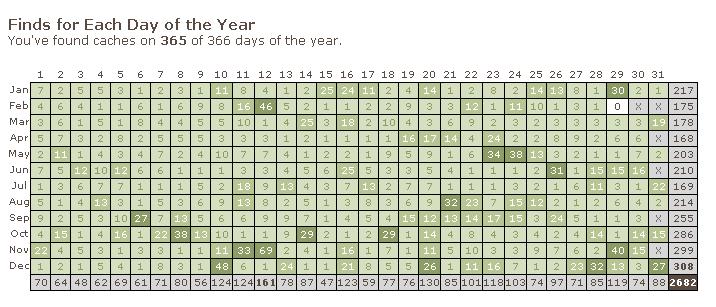Does your caching calendar look like this?

This is your chance to finally get the most elusive green block of them all!
Even if you have already completed your calendar, are still working on it or couldn’t care less about statistics but just enjoy geocaching and meeting other cachers, please come and join us for a quick get together and grab a souvenir for Leap Day.
Here are all the details:

Place: Tucson Spur
Time: 16.30 - 20.00 (or later)
Date: Monday, 29 February, 2016
There is a nice big indoor/outdoor play area for the kids so bring the whole family! All refreshments will be for your own account.
See you there!
In the meantime, here are some interesting facts about 29 February and Leap Years:
Why do we have Leap Years?
The leap year's extra day is necessary because of the "messiness" of our Solar System. One Earth year (a complete orbit around the Sun) does not take an exact number of whole days (one complete spin of the Earth on its axis). In fact, it takes 365.2422 days, give or take.
Until Julius Caesar came to power, people observed a 355-day calendar - with an extra 22-day month every two years. But it was a convoluted solution to the problem and feast days began sliding into different seasons. So Caesar ordered his astronomer, Sosigenes, to simplify things. Sosigenes opted for the 365-day year with an extra day every four years to scoop up the extra hours. This is how the 29 February was born. It was then fine-tuned by Pope Gregory XIII (see below).
Every fourth year is a leap year, as a rule of thumb. But that's not the end of the story. A year that is divisible by 100, but not by 400, is not. So 2000 was a leap year under the Gregorian calendar, as was 1600. But 1700, 1800 and 1900 are not leap years. It seems a bit arbitrary but there's a good reason behind it.
The year is 365 days and a quarter long - but not exactly. If it was exactly, then you could say it was every four years. But it is very slightly less. The answer arrived at by Pope Gregory XIII and his astronomers when they introduced the Gregorian calendar in 1582, was to lose three leap days every 400 years. The maths has hung together ever since. It will need to be rethought in about 10,000 years' time, but by then mankind might have come up with a new system.
Why is February 29, not February 31, a leap year day?
All the other months have 30 or 31 days, but February suffered from the ego of Roman Emperor Caesar Augustus. Under Julius Caesar, February had 30 days, but when Caesar Augustus was emperor he was peeved that his month - August - had only 29 days, whereas the month named after his predecessor Julius - July - had 31. So he pinched a couple of days for August to make it the same as July and it was poor old February that lost out.
Did you know?
-
Women propose to their men on Leap Day. According to an old Irish legend, St Brigid struck a deal with St Patrick to allow women to propose to men – and not just the other way around – every four years. This is believed to have been introduced to balance the traditional roles of men and women in a similar way to how Leap Day balances the calendar.
- In some places, Leap Day has been known as “Bachelors’ Day” for the same reason. A man was expected to pay a penalty, such as a gown or money, if he refused a marriage proposal from a woman on Leap Day. In many European countries, especially in the upper classes of society, tradition dictates that any man who refuses a woman's proposal on February 29 has to buy her 12 pairs of gloves. The intention is that the woman can wear the gloves to hide the embarrassment of not having an engagement ring. During the middle ages there were laws governing this tradition.
- People born on February 29 are all invited to join The Honor Society of Leap Year Day Babies. According to The Guinness Book of Records, there are world record holders both of a family producing three consecutive generations born on February 29 and of the number of children born on February 29 in the same family.
- In Scotland, it used to be considered unlucky for someone to be born on Leap Day, just like Friday the 13th is considered an unlucky day by many.
-
In Greece it’s said to be unlucky for couples to marry during a Leap Year, and especially on Leap Day.